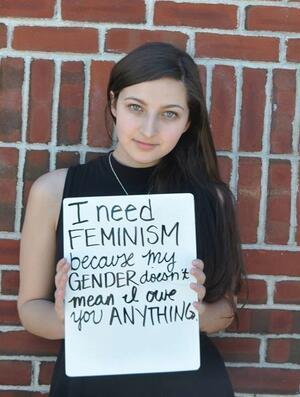To Men Questioning #MeToo
To the men who responded to my #MeToo post by asking what definition of sexual assault we were using:
I know your intention was not to offend.
I actually really like you. I imagine that the flood of #MeToo posts could feel overwhelming and even threatening. But I want to help you understand why your question was not okay.
It was not okay because what I heard you saying was, “You can’t all be using the *regular* definition of sexual assault and harassment. There’s just too many posts. They must be using some special, overly-broad definition.” Sorry, I know that would be nice, but we’re talking about sexual harassment and assault and unfortunately it just really is true that the vast majority of us experience it. Your question was not okay because it was about pretending this isn’t real. (It is.)
It was not okay because what I heard you saying was that the sexual harassment and assault that happened to many of us was probably “normal” and that we were making too big of a deal of it. This should go without saying, but there’s really no such thing as acceptable levels of sexual harassment. Implying otherwise contributes to the culture that makes all this possible.
Your question was not okay because it suggested there are some acts of harassment that don’t really count.
It was not okay, because your question implied there is some answer I could give that would let you off the hook. Like if we were “just” catcalled or propositioned at work, you can go about your day and forget about this. But there’s not. As long as, according to us, we’ve been abused or harassed, there’s a problem that needs addressing. Whether we’ve been groped or our body has been commented on inappropriately or we’ve been forced sexually, there’s a problem. And as a decent human being, I am going to assume that once you acknowledge the seriousness of the problem, you are going to want to contribute to solving it. Your question was not okay because it was about dodging that responsibility.
It was not okay because what I heard you saying was that I needed to recount what happened to me in more detail before you could decide whether it “counts” as “real” sexual assault. In case it’s not clear, that’s not okay. You aren’t the arbiter of my experience. As long as it felt not okay to me, it’s not okay. And it wasn’t. That’s all you should ever need to know. I want you to know that after I decided to respond to your question by sharing publicly about one of the times I have experienced sexual assault, I had nightmares for the next two nights. Please remember that those are the stakes—minimally—when you ask people to share more details than they want to. And when someone honors you with that kind of painful story, respond with kindness. Your question was not okay, because it’s never fair to push someone to do that kind of emotional work.
It wasn’t okay, because it wasn’t gratitude. I want you to see how freaking brave these folks are for coming forward, and I want you to realize that we’re doing it *for your sake*, to help *you* see the magnitude of this problem. We didn’t do this for fun—it’s REALLY REALLY not fun to dredge these memories up—and we are already plenty aware. Your question was not okay, because it wasn’t offered in a spirit of recognizing the gift you’ve been given.
It was not okay because I’m still thinking about it, and I bet you aren’t.
It was not okay, because honestly the only acceptable response would have been: “I’m so sorry that happened to you—what can I do to help stop this epidemic of abuse?”








Thank you for this. A thousand times, thank you.